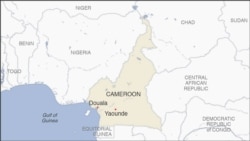Cameroon's displaced Anglophones, who fled from the separatist war in western regions to the capital, are accusing authorities of harassment. Last week, the government declared a security alert following two explosions in Yaounde and began raids on houses in English-speaking majority neighborhoods.
Many English-speaking Cameroonians in the capital say they have stories of ordeals with the police, either in their houses or along the streets.
One of them is a 31-year-old journalist whom we’ll call Rose to protect her safety. She told VOA that since her national identity card expired a week ago, all her attempts to get a new one from the police identification office have failed.
"When I approached the police officer, she asked my profession and I told her I was a journalist," Rose said. "She shouted at me and drove me out of her office because I spoke in English. She told me that we are Anglophones and we are Ambazonians, and we ran from our places and we are hiding in Yaounde."
Rose, who fled fighting in the southwestern town of Mamfe two years ago, said she submitted a complaint to the police headquarters in Yaounde and was still waiting for a reply.
Paid for his freedom
Barber Genesis Ngumulah, 32, escaped fighting in the northwestern town of Bafut three years ago. He said he had been arrested twice this week, and both times he was accused of being a separatist fighter.
Ngumulah said he was forced to pay an illegal fee of about $90 to regain his freedom.
"They said that we were from Bamenda, that we are even the Amba boys [separatist fighters], that we came to hide at Mballa 2 [a neighborhood in Yaounde]," he said. "I was surprised that they locked me up there. Then the next day, they asked me to pay [the fee]. I was forced to borrow the money to pay before I go out of the place. We were more than 25 in one cell."
The harassment of English speakers has intensified within the past two weeks as Cameroon declared the security alert. Naseri Paul Bea, governor of the center region of Cameroon where Yaounde is located, said he had not sent out the police and military to harass anyone. He said the police were intent on making sure there was peace in the city.
"A series of controls are taking place which have no objective to want to go to a particular quarter or particular area where people of particular regions live," he said. "It is intended for the security of each and every one of us and when the police or the gendarmes come, we should be able to cooperate."
Bea promised to punish any police officer who abused the rights of civilians.
Warning of radicalization
Activist Hamad Abdouramann of the Cameroon Rights Center said it was unfortunate that English-speakers who have escaped from crisis-prone regions for safety were being treated badly. He said that if care was not taken, the English-speakers might be radicalized.
Abdouramann said Cameroonians should respect others' language, origin and culture if they want to live in peace. He said the government should work together with rights groups to encourage all Cameroonians to cultivate tolerance.
The United Nations says more than 500,000 English-speaking Cameroonians have fled the North West and South West regions since 2016, when separatist groups began fighting for an independent country.
A majority of the displaced now live in the French-speaking regions of the central African state.





